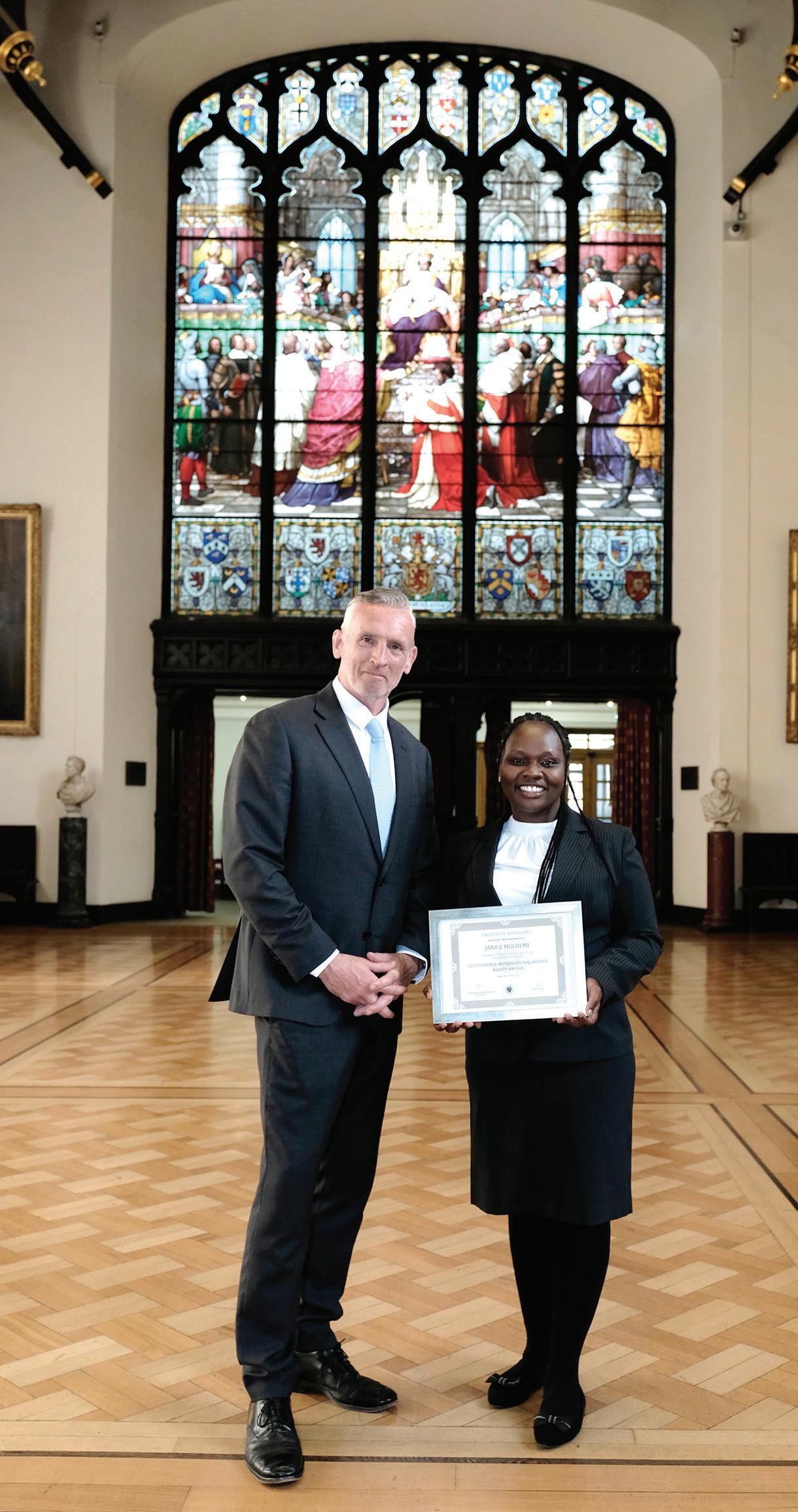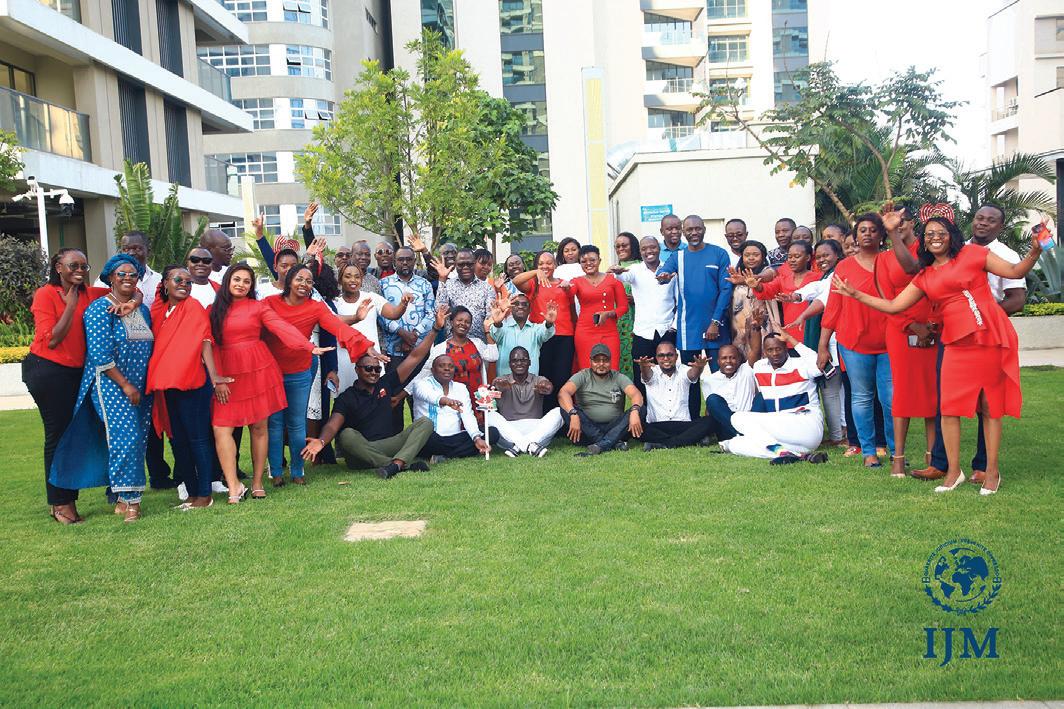
4 minute read
Interview with Janice Muchemi
Interview with
Janice Muchemi

Charity Mafuba talks to Janice Muchemi, an Advocate of the High Court of Kenya about her work at the International Justice Mission (IJM) and her recent accomplishment as the recipient of the Scottish Bar International Human Rights Award for 2024/2025
Charity: Janice, can you please briefly tell us about yourself?
Janice: My name is Janice Muchemi from Nairobi, Kenya. Professionally, I am a practicing Advocate of the High Court of Kenya currently serving as a Program Attorney at International Justice Mission-Kenya (IJM-K), where I represent clients whose rights have been violated.
In my personal life I am a wife and a mother of two children aged 5 and 2 years.
Charity: Where does your passion for advocacy of human rights stem from?
Janice: My passion stems from the clients I serve. At IJM we seek to support people living in poverty who are especially vulnerable to violence and injustice. Many of them are unable to access justice without support. Being able to use my legal skills to walk with them on the path to justice and to advocate for systemic change is what drives me every day.
Charity: Can you please tell us about the International Justice Mission organisation?
Janice: IJM is a global non-governmental organization that partners with governments to protect people in poverty from violence. Our research has shown that people living in poverty are disproportionately at risk of human rights violations. Across the 23 countries where we work, IJM collaborates with public justice systems to strengthen their capacity to serve all people equally and effectively.
Charity: The Police Abuse of Power (PAP) casework programme? and
Janice: The PAP program is unique to IJM Kenya, and focuses on holding the police accountable when they abuse their powers, while also supporting efforts to professionalize the National Police Service. We provide training, support wellness initiatives, and contribute to policy development. At the same time, we engage in litigation, representing victims of police abuse in criminal cases to ensure accountability, justice, and deterrence.
Charity: Violence Against Women and Children (VAWC) casework programme?
Janice: This program aims to strengthen the public justice system’s ability to respond effectively to sexual and gender-based violence. We work to ensure that women and children who survive such violence are treated with dignity and protected as they seek justice. We do this through close collaboration with government actors, civil society, and communities to pursue accountability and prevent future violence.
Charity: You are a female human rights activist who operates in challenging circumstances in Kenya. How has this impacted your wellbeing? And
Janice: The work is emotionally demanding. We interact with trauma survivors daily, and the stories of abuse and torture take a toll. Thankfully, IJM has a strong staff care program in place. I also work as part of a multidisciplinary team, and the peer support we give each other helps us persevere.

Charity: Congratulations on winning the Scottish Bar International Human Rights Award for 2024/2025.
Can you please tell us about this award? And what winning this award means to you?
Janice: This award recognizes human rights defenders who speak up for the vulnerable and represent the voiceless. Receiving it is deeply humbling. It affirms that the efforts we are making in Kenya are being seen and appreciated globally.
The Faculty of Advocates in Scotland saw value in the innovative and persistent work we are doing to reform our justice system. Coming from a jurisdiction where the legal system is accessible and victim-centred, their recognition validates our vision. It renews my hope and strengthens our resolve to keep pressing for a justice system that truly serves and protects all, regardless of socio-economic status.

Charity: What does the future hold that you can share?
Janice: There’s still so much to be done to build public trust in the justice system in Kenya. One key focus for us is increasing public awareness of successful prosecutions and system reforms to encourage more survivors to come forward.
We are also working closely with government agencies to transition some of our interventions such as trauma-informed care into fully owned public programs. This approach has already transformed how victims, witnesses, and even accused persons are treated within the system. We believe that with these changes, cases of re-traumatization of victims will soon be a thing of the past.■
Janice Muchemi,
Programme Attorney
International Justice Mission
https://www.linkedin.com/in/janice-muchemi-8262567a/
Interviewed by
Charity Mafuba
Commissioning Editor and Director,
Solicitor-(England and Wales), New York Attorney
IJM is a global non-governmental organization that partners with governments to protect people in poverty from violence.








